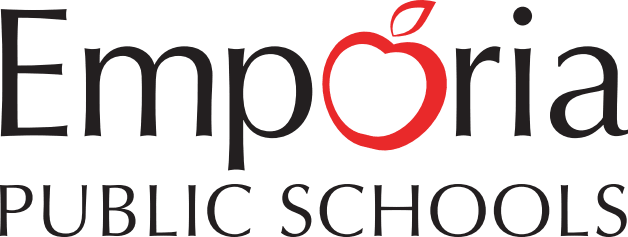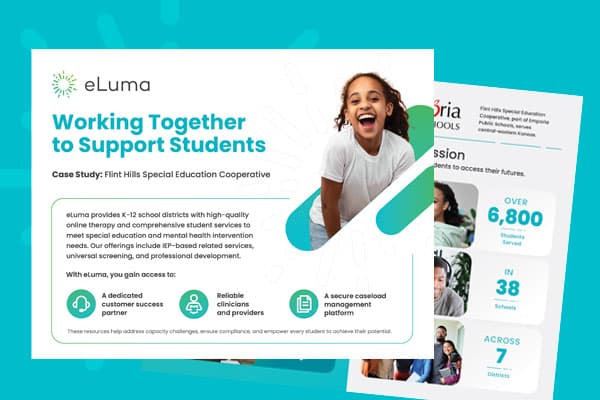Flint Hills Special Education Cooperative: Hitting the bulls-eye on speech teletherapy
Case Study
Discover how the Flint Hills Special Education Cooperative (FHSEC) revolutionizes speech therapy services in central-eastern Kansas. This case study delves into how FHSEC is using online therapy to meet the growing demand for specialized services, ensuring quality education for all students.
About Flint Hills Special Education Cooperative
The Flint Hills Special Education Cooperative (FHSEC) serves 38 schools across 7 school districts in east central Kansas. Flint Hills Special Education Cooperative provides an array of services for students from birth through 21 years of age. The majority of the students are served in inclusive settings in their neighborhood schools.

Table of Contents
In the past few years, Tara Glades has seen a couple of important trends heading in opposite directions.
The first is that more public school children are needing special education services.
The second is it’s getting harder to find qualified special education therapists, especially in the less-populated areas of Kansas served by her organization.
eLuma’s online therapy services have proved critical pre and post-pandemic and now play a vital role in the overall strategy, especially with speech therapy.
Glades is Director of Student Services at Flint Hills Special Education Cooperative (FHSEC), an education services institution serving the needs of seven school districts in central-eastern Kansas. Now in her eighth year with FHSEC, Glades took her current administrative post ahead of the 2021-2022 school year after spending the balance of her time as one of six coordinators representing the various school districts.
As FHSEC tries to serve a growing number of students with special education needs, Glades is looking at an array of options to increase access without diminishing quality. eLuma’s online therapy services have proved critical pre and post-pandemic and now play a vital role in the overall strategy, especially with speech therapy.
FHSEC serves Emporia, Kansas and surrounding districts
About two-thirds of the students served by FHSEC are from the school district in Emporia, Kansas, with the rest coming from neighboring rural school districts. Located between Topeka and Wichita, Emporia is the seat of Lyon County and home to about 24,000 Kansans. It’s also home to Emporia State University and Flint Hills Technical College.
Nationally, Emporia is known as the disc golf capital of America and host of the annual Dynamic Discs Open. It’s also the yearly showcase for Unbound Gravel, an event that attracts thousands of cyclists to the bumpy gravel trails around Emporia for races ranging from 25 to 350 miles.
A SPED cooperative for east-central Kansas
FHSEC serves the special education needs of up to 6,800 students across 38 schools in seven districts in and around Emporia, the co-op’s largest student population and home base. FHSEC provides access to live and virtual therapists, including technology resources. About 1,000 students served by FHSEC have one of 13 defined exceptionalities, which entitles them to special services. FHSEC employs six “coordinators” to administer to the needs of its seven school districts, as well as specialized therapists.
A growing need for online speech therapy
“Glades says about 680 students are receiving speech therapy services through FHSEC, a number that seems to grow in real and proportional terms every year…”
Over the last few years, demand for speech therapy has skyrocketed at FHSEC. In Kansas statewide, about 15% of public school students receive special education services, so demand is nothing new. But recently, speech has become a more pressing area.
Glades says about 680 students are receiving speech therapy services through FHSEC, a number that seems to grow in real and proportional terms every year in recent memory. More kids are coming to school with speech deficits, a trend that preceded the COVID-19 pandemic but was accelerated by it.
Glades theorizes that remote school took an outsize toll on “pandemic toddlers” in the Emporia region because many of their parents weren’t able to work from home and help them learn and develop proper speech skills during a critical time. In the Emporia region, factories and meat plants are major employers, meaning the shift to home-based work enjoyed by so many amid the pandemic didn’t occur there. As a result, speech therapy has become critical, and FHSEC has leaned on effective teletherapy services to close the widening gap.
A partner in student success
“It was refreshing to see them lean in without nickel and diming us,” Glades says. “We welcomed the camaraderie and collaboration. It made us stronger and went a long way toward convincing parents who were originally wary of online services.”
Even prior to the pandemic, FHSEC was seeing increased demand for a range of services, with speech therapy leading the way. Glades believes increased referrals may have been influenced by better early identification efforts in her part of Kansas because pre-school children have been the fastest growing segment with exceptionalities in recent years.
Problem is, it’s hard to find enough qualified, credentialed therapists for growing demand in rural areas. In 2017, FHSEC contracted with a company to help them add teletherapy services to finish the school year. It didn’t go well – the company didn’t communicate well and billed by the hour, which Glades said showed a priority on profits over the children’s needs. During the 2018-2019 school year, FHSEC made a second foray into teletherapy, this time with eLuma.
“It was a breath of fresh air,” Glades says.
eLuma’s teletherapy model was more conducive to student success, with per-pupil billing, highly communicative staff, and highly qualified and engaged teletherapists who won over skeptical parents. In one instance, eLuma’s therapists joined a professional learning communities (PCL) meeting which was after normal business hours and not part of the contract, a gesture that impressed Glades and reflected the teletherapists’ commitment to the students.
“It was refreshing to see them lean in without nickel and diming us,” Glades says. “We welcomed the camaraderie and collaboration. It made us stronger and went a long way toward convincing parents who were originally wary of online services.”
Today, FHSEC partners with eLuma to handle all its therapy augmentation needs, including filling in when an in-person therapist is sick, moves, or goes on maternity leave.
“People tend to be skeptical that online services can be as good as those delivered in person,” Glades says. “When it comes to teletherapy, I tell everyone to try it. Take a look at what’s happening in a real session. eLuma brings in highly skilled therapists who do great work on behalf of our children.”



